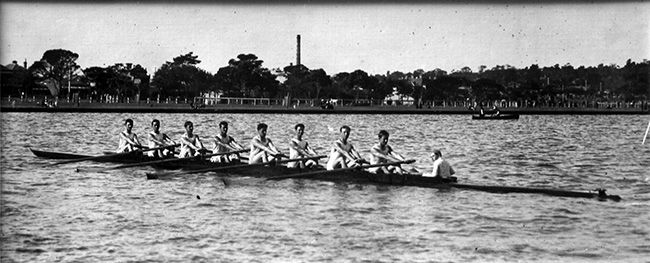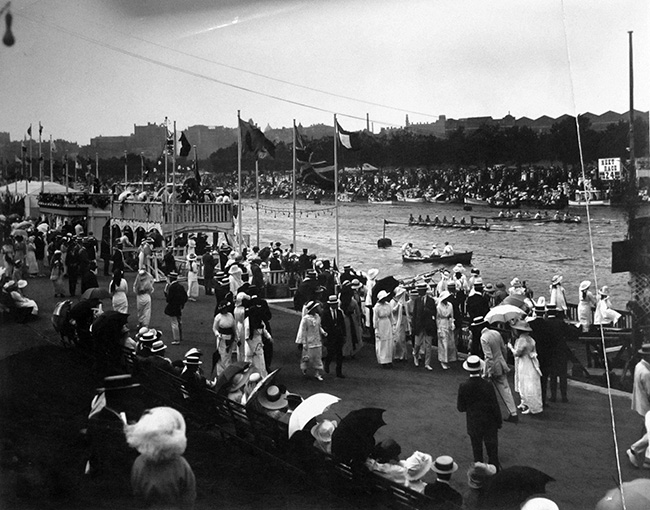J William Cumberland
Mercantile Rowing Club (VIC)
JW Cumberland, known as William, was one of the Mercantile Rowing Club members who died in service in WWI.
William the last Mercantile member to die in this conflict, only months before the Armistice. He was a popular Club member. He was a member of the Committee and, for a short period before enlistment, was acting Vice-Captain. He won the Points Trophy for the most successful oarsman in the 1913-14 season.
Six of Mercantile's members died in WWI. Three of them came from our junior eight which won at Henley in 1914, the last full season before the war. They were: J W Cumberland, N C Nation and N Johnson.

1914 Mercantile Junior Eight which won at Henley - three of this crew died in WWI including Cumberland
This crew obviously enjoyed their rowing and the company of each other. They had won the maiden eight double at Upper Yarra and Albert Park Lake Regattas in the previous season and had kept together through winter to race at the junior level. Henley regatta in those days was not only then first regatta of the season in late October, but also the biggest and most prestigious regatta. They were the next generation of senior oarsmen who were lost to the Club in WWI.

1914 Henley on Yarra
In the 1921-22, three new fours were named in their honour.
William Cumberland was a clerk at WD & HO Wills (Australia) Ltd and enlisted 20th December 1915. He lived at 175 Lee Street North Carlton. Four months later on 4th April 1916, he travelled to Egypt on the Euripides and disembarked at Suez on 12th May 1916. He was transferred to the British Expeditionary Force which embarked from Alexandria later that month for France.
The following story concerning William Cumberland appeared in The Winner, 31st May 1916.
RESCUE OF BANK BOOK HAS DRAMATIC RESULT
His great leadership qualities were soon recognized being promoted in the field to Lance Corporal on 3rd August 1916, and then to Corporal on 27th October 1916, less than a year after enlistment. He suffered severe trench foot in the winter of 1916 which saw him transferred to England for treatment. This meant that he probably lost some parts of his foot for this to occur. Trench foot was an infection of the feet caused by cold, wet and insanitary conditions. In the trenches men stood for hours on end in waterlogged trenches without being able to remove wet socks or boots. The feet would gradually go numb. If untreated, trench foot could turn gangrenous and result in amputation. Trench foot was a particular problem in the early stages of the war before they learned to manage it. For example, during the winter of 1914-15 over 20,000 men in the British Army were treated for trench foot.
By June 1917, he was classified as fit and returned to his Battalion. By September 1917 he was again promoted in the field to Lance Sergeant. But then later that month, he was wounded in action with a gun-shot to the chest. One can only assume that such a wound have most probably arisen from a frontal assault so common in WWI. It was so severe that he was sent back to England for treatment.
By January 1918, three months later, he was fit enough to return to war. On 17th June 1918 he was awarded the Meritorious Service Medal, a significant bravery award. He was now a battle hardened and highly experienced soldier, a leader of men. He was in all respects a distinguished soldier.
On 25th June 1918, he was promoted in the field to Sergeant.
On 9th August 1918, he was wounded in action with gun-shot wounds to the leg and head. Such wounds again are consistent with another frontal assault on the enemy. He died the next day.
He was buried in the Vignacourt British Cemetery in France. His personal effects and Meritorious Service Medal were provided to his father, John Cumberland.
In a letter to his father in 1919 he was described as a brave and gallant soldier whose magnificent conduct in the field of battle has helped to earn Australian soldiers great fame.
Andrew Guerin 2014

